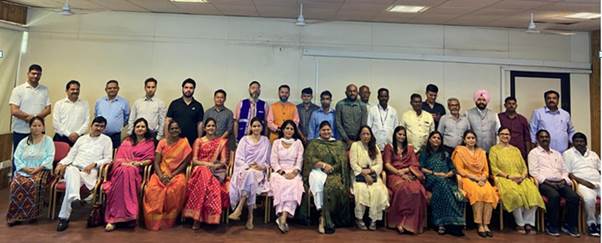Harper Adams University Launches Centre to Propel Innovation in Connected and Automated Construction
A new centre has been launched to drive forward innovation in construction by bringing together a diverse range of disciplines from Harper Adams University and beyond.
The Centre for Connected and Automated Plant (CCAP), created in conjunction with the Transport Research Laboratory (TRL), aims to advance developments in connected and automated construction.
Connected and automated construction uses the latest in automation and AI technology to link people, tools and processes, enabling all those working on a particular project to collaborate in real time without the need for a physical presence on site.
The Centre will draw upon the University’s expertise in engineering innovation, data science, artificial intelligence and automation, and was launched this summer with a conference bringing together industry stakeholders, including construction companies, Government bodies, academics and more.
As it develops, CCAP will provide an independent, collaborative environment to draw stakeholders together – and will generate research and knowledge exchange opportunities.
At the inaugural conference, key industry figures met to discuss the steps that will need to be taken in the next decade to make the UK a world leader in the design, production and application of connected and automated construction.
Companies involved included National Highways, Costain, JCB and Caterpillar, along with representation from organisations including UKRI and the CEA, and Dr Annette Pass, the Deputy Chief Scientific Officer for the Department for Transport, was the keynote speaker.
The conference was drawn together by Harper Adams Programme Manager for Engineering Courses, Greg Rowsell and Senior Lecturer in Automotive Engineering James Croxford.
Greg said: “With a new Government only recently in place, it was exciting to hear that Annette would be highlighting the collaborative work of the Harper Adams Engineering department – and the opportunities for the construction industry to learn from developments in Agri-Tech – in her first meeting with the Department’s new Minister.
“Getting this right could be transformative for the construction industry – and for the UK – and we want to make sure the expertise we have at Harper Adams and the industry links we enjoy can help harness and direct these emerging technologies.”
James added: “Discussions focussed on themes of economics, technology and developing the future workforce. We were also joined by a group of Year 12 students from Newport, who not only attended some of the presentations, but also took part in a parallel STEM activity to experience the challenges of developing an automated construction site!
“Equipping both our current and our future students with the skills industry needs both now and in the future is key, not only for their future career prospects – but also for the industries they will go on to serve.
“During the day, we also took the opportunity to showcase the exciting potential of our work at the Quad in Telford, and our industry delegates showed particular interest in the expertise being developed within Station Quarter around Data Science, AI and Robotics.”

